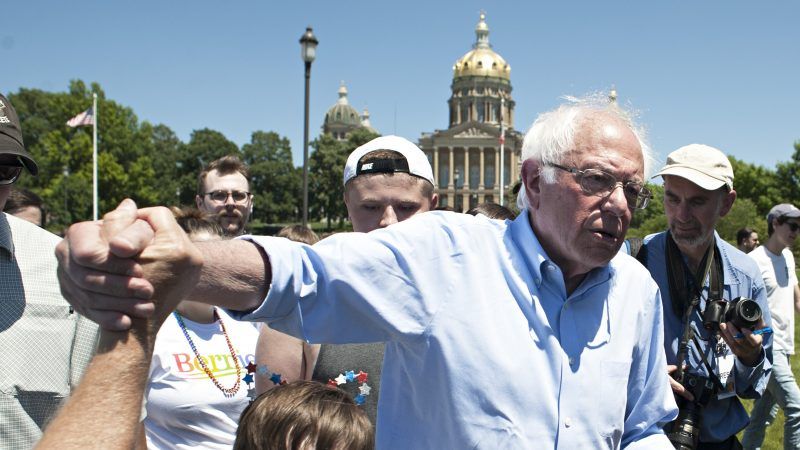Democrats Are Fighting Over Socialism, and the Socialists Are Winning
Bernie Sanders' Democratic rivals may laugh at his socialist pretensions. But in important ways, he's winning.

On Wednesday, Bernie Sanders, the independent senator and a candidate for the Democratic presidential nomination, delivered a major speech on socialism. Titled, "How Democratic Socialism Is the Only Way to Defeat Oligarchy and Authoritarianism," the speech sought to give us Sanders' own definition of socialism. But the address left enough lingering questions that it might better be understood as a declaration simply that Sanders is a socialist, whatever that is.
Socialism—what it is, whether it's any good, and who counts as a socialist—has become a major divide in the Democratic primary and is likely to play a role in the 2020 general election, no matter who is on the ticket.
Former Colorado Gov. John Hickenlooper (D), one of the many low-polling extras in the cast-of-thousands production that is the Democrats' 2020 primary, recently told a group of California Democrats that "socialism is not the answer," and has said he wants to differentiate his candidacy by opposing the idea.
In the run-up to the socialism speech, as Edward Isaac-Dovere reported in The Atlantic, some of Sanders' primary rivals offered careful non-responses, criticism, and reactions that are revealing in other ways: Sen. Michael Bennet (D–Colo.), another low-ranked primary candidate, heard the title of the speech and said, "I don't think the American people even know what that means." And it's not just back-benchers rolling their eyes. When Sen. Elizabeth Warren (D–Mass.), arguably the candidate closest to Sanders in terms of policy outlook, heard the name of the speech, she laughed.
Looked at one way, Sanders is losing the battle over socialism. His rivals laugh at him, and the leading contender for the primary, according to the (yes, still very early) polls is former Vice President Joe Biden, who has branded himself a moderate with an insider's track record, in direct contrast to Sanders' ornery outsider approach to politics. At the beginning of the year, a majority of Democratic and Democratic-leaning voters told Gallup they wanted a party that was more moderate, not more liberal. That hardly sounds like a recipe for a socialist takeover.
Yet Sanders has remained near the top of the polls all year, even in a primary field that looks like a Where's Waldo? splash page. Millennials have embraced socialism in record numbers, and socialism, once an insult even within the Democratic party, is no longer a dirty word, at least among the party's rising stars and most engaged activists. That's largely thanks to Sanders' scruffy insistence on using the word. (For someone who finds capitalism so distasteful, he's pretty good at marketing.) Candidates like Hickenlooper who have directly attacked socialism have faced strong internal resistance; he was loudly booed at the California Democratic Convention, and he and Bennett are far behind in the race.
Most importantly, the Democratic party has shifted its policy priorities. Sanders' agenda is not quite the Democratic party's agenda, but Democrats are far closer to Sanders' democratic socialist platform than they were a decade or two ago. The Democratic party may not be branding itself as the party of socialism, and compared with left-leaning parties around the world, its socialist tendencies are less pronounced, but it is certainly closer than it has been in decades. The Democratic party isn't really arguing about what direction to go, just precisely how far.
Beyond the Democratic party, an inclination toward socialism, or something like it, has taken hold: The generalized mood of American voters is more liberal than at any time in the last 68 years. Left-leaning economic theories have gained new prominence in the wake of the financial crisis.
Even Republicans seem to have developed a soft spot for what are essentially socialist ideas; President Trump campaigned on the promise not to touch Medicare or Social Security, America's largest socialized benefit programs. These entitlements remain vastly popular with seniors, a group that otherwise leans to the right. Over the last year, multiple polls have found a majority of Republicans support for Medicare for All, the most prominent of Sanders' policy goals.
Trump may be running (somewhat incoherently) against the word "socialism" but it seems clear that a non-trivial portion of his supporters favors at least some components of the democratic socialist agenda. Many voters, as well as at least a few politicians, remain confused about what Medicare for All means, but these surveys nonetheless suggest that the American electorate has socialist tendencies.
Which may explain why Sanders' speech was mostly a recitation of familiar talking points about the New Deal, socialism's various economic guarantees, the problems with Donald Trump, and the evils of "unfettered capitalism"—which mostly seems to be an objection to the existence of individuals who are very rich.
The democratic socialism Sanders is promoting has an agenda, of sorts, but deep down, it's less a platform than a tendency, a manner of understanding politics and economics that is light on particulars and heavy on easy assumptions about the way the world should be and what it should offer, namely a litany of government benefits, regardless of the political and fiscal hurdles involved. It's an airy and reckless populist fantasy of broad social and economic transformation—an ideology, yes, but also an attitude, one that will take whatever support it can get. And regardless of how Sanders himself fares in this race, it is likely to inform our politics for years to come.

Show Comments (106)